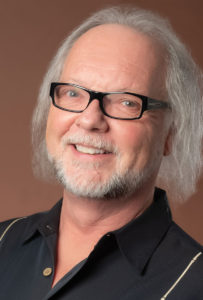by Tomm Carroll
In the final throes of my decade-and-a-half tenure as the Editors Guild’s Publications Director and editor of this publication (and a retiree by the time you read this), my thoughts naturally turn back to the beginning of my journey into this line of work.
I’d always enjoyed English class, including the challenge of diagramming sentences while studying grammar. I liked to read too — albeit mostly comic books and (the soon-to-be-defunct) MAD magazine. Of course, watching television was another favorite pastime back then (the early/mid-1960s), and my affinity for comics, specifically the superhero genre, led me to regularly catch Adventures of Superman (1952-1958), which I did not know were reruns then, nor that the last five seasons were filmed in color (until my parents bought a color TV in 1964).

Photo by Wm. Stetz
But aside from the super powers of Clark Kent’s (George Reeves) alter ego, I was also fascinated by his “day job” as a newspaper reporter, along with his colleagues Lois Lane (Phyllis Coates, then Noel Neill) and especially “cub reporter” Jimmy Olsen (Jack Larson). I knew I would never be Superman, but the notion of becoming a young reporter was intriguing to me since I was starting to develop an interest in writing.
A few years later, after my parents started taking me to movie theatres, I had outgrown cartoons and Disney live-action films and was more captivated by comedies — mostly the ones featuring the stars of the TV shows I liked. One favorite I still recall is The Ghost and Mr. Chicken (1966), starring Don Knotts in his first feature after leaving his regular role as Barney Fife on television’s The Andy Griffith Show (1960-1968).
(Coincidentally, both Mr. Chicken and over 50 episodes of Superman were edited by the same man: Sam E. Waxman.)
In the film, Knotts portrayed Luther Heggs, a bumbling typesetter who longs to be a reporter for his small-town newspaper and is assigned to spend the night at an allegedly haunted house on the 20th anniversary of a murder-suicide that took place there — and to write a story about it. Yes, hilarity and silliness ensued — particularly for this 12-year-old with similar aspirations sitting in the theatre.
While the film is full of then-quotable quotes (“Atta boy, Luther!,” “The electrician must be a Democrat,” “And they even used Bon Ami!”), there is one that still resonates with me to this day. A very nervous Luther is about to address a crowd at an outdoor function about his night in the “murder house.” Clearly frightened by public speaking (a trait I shared early in my career), he trembles with apprehension, even more so after a breeze blows the notes from his tremulous hands, and he anxiously ad-libs:
“When you work with words…words are your work.”
Yes, it got a laugh from the audience, including me. But I also immediately thought that in its self-evident simplicity (or is that simplistic self-evidency?), this trite truism really summed up what I wanted to do as an occupation: work with words. And so I did.
My entire full-time career has been spent reporting, writing and editing — first for newspapers and magazines and, since 1983, for publications and projects within the entertainment industry. Also, I’ve always written freelance, which I continue to this day, originally about film (something I ceased once I joined the industry) and music. About 15 years ago, around the time I was hired by the Guild, I began freelancing almost exclusively about beer…
…which makes for an apt segue for me to hoist a proverbial pint in gratitude to the Editors Guild for affording me the unique opportunity to shepherd and steward its magazine and sister website for all these years. I’m truly honored by that privilege.
Boundless thank-yous to the Guild’s Board of Directors, staff and certainly the membership/readership, as well as all the iterations of my Publications Committee (or Pub Com, as we call it) — predominantly the current one, co-chaired by the incredibly supportive A.J. Catoline and Jeff Burman. And an extra-special shout-out to National Executive Director Cathy Repola for bringing me into the fold in the first place!
CineMontage is a vastly different periodical than the Editors Guild Magazine I inherited. And it is now in the more-than-capable hands of Communications Director Scott Collins, who will put his own imprint on its physical and digital presence — as he rightfully should — ushering it into its next chapter.
And speaking of a next phase, the voyage upon which I have just embarked, I will leave you with a quote from one of my idols, Oscar Wilde, who definitely had a way of working with words:
“Work is the curse of the drinking class.”
Cheers!


